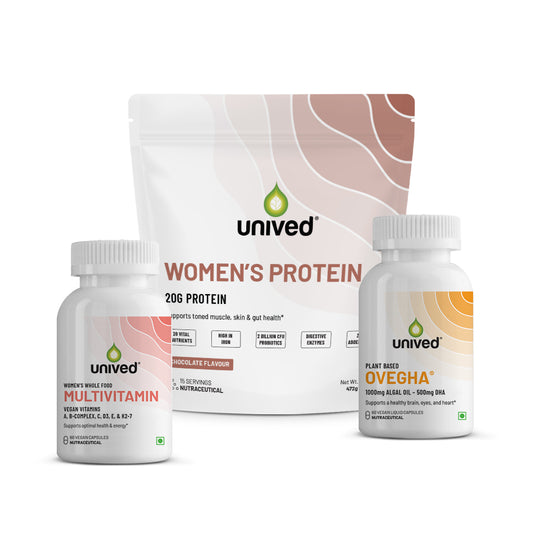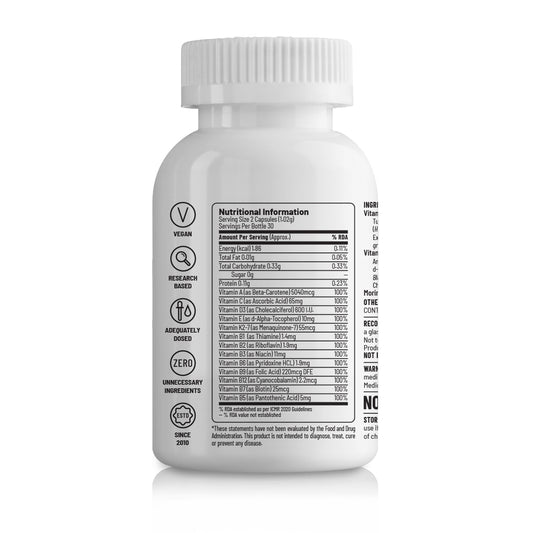A diet that is rich in balanced nutrients which includes
fruits, vegetables, protein, fiber, carbohydrates, healthy fat, and whole
grains and legumes should be enough to provide most of the nutrients needed for
maintaining good health. But not everyone manages to eat healthy food with
balanced nutrients every day because of various factors like busy lifestyles,
health disorders, malabsorption conditions, illness, poor appetite, and so on.
The ‘lifestyle’ factors involve young to middle-aged adults,
especially women with high occupational pressure or the double burden of family
and work, for whom time is always in short supply. In this group, the risk for
an inadequate micronutrient status is often the result of lifestyle-associated
behavior, such as rushed meals, unhealthy food choices, chronic or periodical
dieting, and stress-related behavior. Increased requirements may also cause an
inadequate vitamin and mineral status; for example, as may occur in pregnancy
and lactation, menstruation, menopause, and in patients with a certain illness
or underlying diseases. As a result of
inadequate micronutrient insufficiency or mild or marginal deficiency may occur
where the clinical symptoms progress through several subclinical stages [1].
Therefore, under such circumstances, supplemental
multivitamins come to the rescue, which provides you with the daily recommended
dietary allowances of the vitamins and minerals in the right proportion to
protect the body from insufficiency or even mild to marginal deficiency of the
vitamins.
Vitamins and minerals are of paramount importance to the
body’s metabolic process. They play a key role in almost all biological
processes in the body. For example, Vitamin B12 is needed to form red blood
cells and DNA and therefore is vital to maintain the level of Vitamin B12 in
the body. Any insufficiency or deficiency of vitamin b12 will lead to
conditions like anemia where there are not enough red blood cells in the body.
Without red blood cells, tissues and organs won’t get enough oxygen. Minerals
like magnesium support muscle and nerve function, and energy production.
Likewise, every vitamin and mineral has its distinctive role to play. Some
vitamins work in synergy to aid a biological process.
Not meeting the body’s requirement for Vitamins and Minerals
can have a huge impact on health. Women especially require more amounts of
micronutrients. Adequate intake of calcium, iron, and folic acid along with
other vitamins and minerals is of special importance for women.
Our Formulation
Unived’s Wholefood Multivitamin contains all the vitamins
from wholefood blend.
Organic Freeze Dried Acerola Juice Powder, Culture of
S.cerevisiae, MenaquinGold as Menaquinone-7® from fermented Chickpeas,
Naturall-e™ as d-Alpha-Tocopherol from Soya Oilseeds, Natural Beta-Carotene
from Blakeslea trispora, Vitashine™ as Cholecalciferol from Lichen. L-5
Methyltetrahydrofolate (95%).
Role of Vitamins and Minerals:
Vitamin A:
- Maintains health of specialized tissues such as the retina.
- Aids in growth and health of skin and mucous membranes.
- Promotes normal development of teeth, soft and skeletal
tissue.
Vitamin B1:
- Helps the body convert food into energy, and aids the
function of the heart and cardiovascular system and the brain and nervous
system.
Vitamin B2:
- Works with other B vitamins to promote healthy growth and
tissue repair, and helps release energy from carbohydrates. Promotes healthy
skin and healthy red blood cell production.
Vitamin B3:
- Works with other B vitamins to help release energy from
carbohydrates. - Promotes healthy nerves
- Promotes healthy skin and digestive system.
Vitamin B5:
- Helps turn the food you eat into the energy you need. It’s
important for many functions in the body, especially making and breaking down
fats.
Vitamin B6:
- Important for maintaining healthy brain function, the
formation of red blood cells, the conversion of protein and the synthesis of
antibodies in support of the immune system.
Vitamin B7:
- Vitamin B7 is an important part of enzymes in the body that
break down substances like fats, carbohydrates, and others. - Helps in promoting healthy hair and nails.
Vitamin B9:
- Aids in the production of red blood cells.
- Aids in the synthesis of DNA.
- Works with B12 and vitamin C to help the body digest and
utilize proteins.
Vitamin B12:
- Important for metabolism, the formation of red blood cells,
and the maintenance of the central nervous system, which includes the brain and
spinal cord.
Vitamin C:
- Vitamin C promotes a healthy immune system, helps wounds
heal, maintains connective tissue, and aids in the absorption of iron.
Vitamin D:
- Promotes the body’s absorption of calcium, essential to the
development of healthy bones and teeth.
Vitamin E:
- Protects cell membranes and tissues from damage by
oxidation. - Aids in the formation of red blood cells and the use of
vitamin K. - Promotes function of a healthy circulatory system.
Vitamin K1:
- Helps in blood clotting.
- Promotes healthy bones.
References:
1. Huskisson, E., S. Maggini, and M. Ruf. "The role of
vitamins and minerals in energy metabolism and well-being." Journal of
international medical research 35.3 (2007): 277-289.
2. Pietrzik, K. in Huskisson, E., S. Maggini, and M. Ruf.
"The role of vitamins and minerals in energy metabolism and
well-being." Journal of international medical research 35.3 (2007):
277-289.
3. MedlinePlus [Internet]. Meagan Bridges, RD: National
Library of Medicine (US); Vitamin A Benefits; [updated 2020 Jun 10; reviewed
2021 Nov 3; cited 2022 Dec 18]. Available from:
https://medlineplus.gov/ency/imagepages/18096.htm
4. MedlinePlus [Internet]. Meagan Bridges, RD: National
Library of Medicine (US); Vitamin B1 Benefits; [reviewed 2021 Nov 3; cited 2022
Dec 18]. Available from: Available from:
https://medlineplus.gov/ency/imagepages/18098.htm
5. MedlinePlus [Internet]. Meagan Bridges, RD: National
Library of Medicine (US); Vitamin B2 Benefits; [reviewed 2021 Nov 3; cited 2022
Dec 18]. Available from: Available from:
https://medlineplus.gov/ency/imagepages/18100.htm





 Sold outVendor:Women's Health
Sold outVendor:Women's Health






